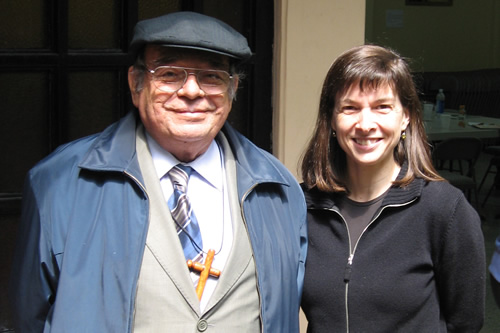Remembering Tatic Samuel – Suzanne Rumsey
“During the day, thousands and thousands of the faithful who had come from throughout the diocese filled the cathedral in honour of the bishop who died on Monday, January 24… In a letter of farewell read at [the mid-day] celebration by one of the leaders of the civil society group Las Abejas (The Bees), made up of the survivors and families of the 45 massacred in Acteal, Chenalhó, in December 1997, they said good-bye to Samuel Ruiz and made the following petition to him: ‘We ask that you not forget us, and that when you speak with our father-mother God you greet God on our behalf. Please tell God that the massacre at Acteal continues in impunity. Tatik (sic) Samuel, brother, father, grandfather, we hope to meet you one day in the house of our father-mother God, together with our martyrs of Acteal.’”
Revista Proceso (on line), January 26, 2011
And so it was that Bishop Samuel Ruiz, the physically diminutive giant of the Mexican church and staunch defender of indigenous rights was returned to and honoured by those to whom he ministered from 1960 to 2000 in the breathtakingly beautiful and tragically violence-torn southern Mexican state of Chiapas.
I had the honour to know and work with Don or Tatic Samuel (both are terms of respect and affection and loosely translate as “father”) as he was know to the Mayan indigenous peoples who are the majority of the faithful in the Catholic Diocese of San Cristobal de las Casas. I met him first in 1992, when I made a visit on behalf of the Inter-Church Committee on Human Rights in Latin America (ICCHRLA, now part of KAIROS) to the Fray Bartolomé Human Rights Centre recently established by Don Samuel in the face of growing tensions and human rights violations in his diocese.
A year later, on the occasion of the visit of Pope John Paul II to Mexico, Don Samuel presented a pastoral letter to the pope and the Catholic Church in Mexico titled, “In This Hour of Grace”. In it he wrote about the economic, political and social context in which the church carried out its ministry in southern Mexico. Faced with the imminent implementation of the North American Free Trade Agreement (NAFTA), Don Samuel stated: “In the face of unemployment and a lack of land, the government has developed political control, because the poverty produced by this [economic] plunder threatens the political order. And so laws are being changed and new crimes invented. This way of acting violates human rights. And so we see that the system in which we live is a violator of human rights.”
Five months later, on January 1, 1994, the indigenous peoples of Chiapas under the leadership of the Zapatista Army for National Liberation (EZLN) declared war against the Mexican government, because NAFTA they stated, was a “death sentence” for Mexico’s indigenous peoples. At the invitation of Don Samuel, and partners in the Mexican human rights movement, I joined Canadian church and civil society organizations in one of a series of human rights fact-finding missions in the immediate aftermath of the 12-day shooting war.
A year later I was back again, this time with a delegation that included Bishop Michael Ingham of the Diocese of New Westminster and Monseñor Francois Thibodeau from the Catholic Diocese of Edmunston, New Brunswick. In the wake of the death of Don Samuel, Bishop Michael recalled him in this way: “I have remembered him often, and spoken of him many times. That trip, with you and Thibodeau and the others, made a deep impression on me. I shall never forget his offering of communion to me at the altar of his cathedral at Epiphany and his words to an Anglican, “we shall not be divided here!” Remarkable. Courageous. A spiritual giant.”
Don Samuel became the key mediator in the peace negotiations between the Zapatistas and the Mexican government which, in 1996, produced the San Andrés Accords on indigenous rights; accords that to this day have not been implemented. It was his role as mediator that led to his nomination for the Nobel Peace Prize in 1995.
In continuing human rights monitoring trips, I was privileged to closely follow his work and that of his diocese until his retirement in 2000. One of thousands from around the world who came to witness the ongoing militarization and the civil society resistance to it, I always found a warm welcome from and an engaging encounter with Don Samuel and the staff at the Fray Bartolomé Human Rights Centre.
Following his retirement Don Samuel left the diocese to head the Mexico City based, Services and Counseling for Peace (SERAPAZ) that carries out research and advocacy and provides training and support to civil society organizations addressing a range of conflicts in the country. I last saw Don Samuel in 2007 when he and SERAPAZ staff met with the PWRDF delegation to Mexico as part of the delegation’s orientation in Mexico City. He was as ever, passionately articulate, full of wisdom, strongly committed to ecumenism, and possessing a deep spirituality, all of which he tempered with a twinkle in his eye and a wicked sense of humour.
At the conclusion of our meeting he charged the delegation to tell the story of what is going on in Mexico, to continue to support organizations’ projects that represent the work of transformation in Mexico, and to ensure that we shared a translated version of our trip report with those with whom we met. The delegation kept those commitments, and PWRDF continues to support important indigenous and women’s rights work in Mexico.
The international solidarity and faith communities, Mexico, and most of all, the indigenous peoples of Chiapas have lost a prophetic voice in the wilderness, and we have all lost our Tatic.









